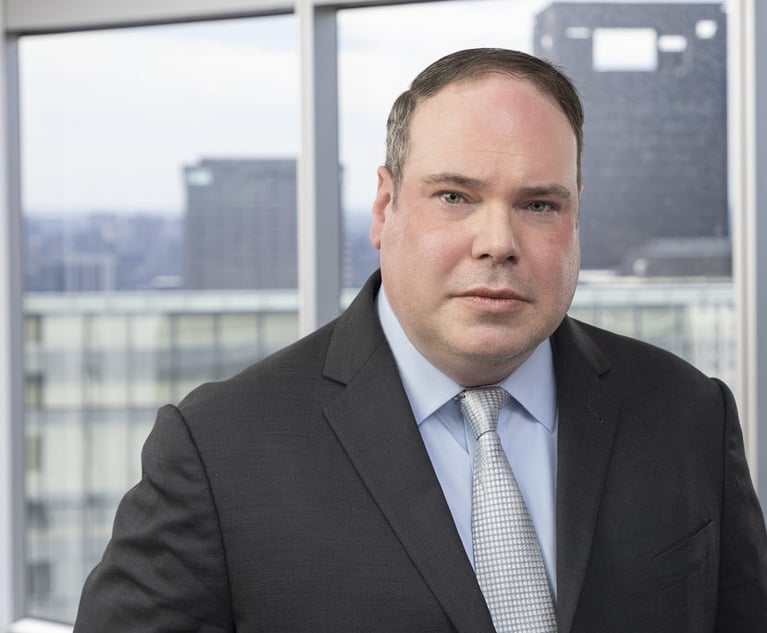Same Goal, Different Plan: Texas Firms Get Creative With Their Women Initiatives
There's no one way to boost the number of women lawyers at a firm and support their road to partnership, but two firms, using different methods, are…
November 30, 2018 at 06:00 AM
7 minute read

There's no one way to boost the number of women lawyers at a firm and support their road to partnership, but two firms, using different methods, are having success in Texas.
Adding women lawyers is slow going, with a recent ALM Intelligence study indicating that the percentage of women associates at AmLaw 200 firms has increased by just two percent and women equity partners by four percent since 2013. Women lawyers comprise 45 percent of associates at AmLaw 200 firms, 27 percent of non-equity partners and 19 percent of equity partners, according to the ALM gender diversity study.
Despite good intentions, it's hard — really hard — to improve those statistics, even with deliberate programs aimed at not only hiring but retaining women lawyers. Through different methods, some firms in Texas are making progress on the gender front. Those firms include Haynes and Boone, which has focused on gender parity in its finance practice group over many years, and Sheppard, Mullin, Richter & Hampton's efforts over the last few months to deliberately hire women in its new Dallas office that the California firm opened in April.
Under leadership of firm founders Mike Boone and Richard Haynes, Haynes and Boone has been hiring women, including many for its finance group, since the firm was founded in 1970. The finance group has benefited. Since 2015, women have comprised 70 percent of the partner promotions in the finance practice group, including both of the group's new partners in 2018.
At Sheppard Mullin's new Dallas office, which opened in April with 18 lateral hires and has grown to 21 lawyers by the end of September, 43 percent of its lawyers are women including two of seven equity partners. The firm's goal was to set the tone right off the bat by hiring women and minority lawyers for the new office.
It should be relatively easy to recruit women to firms, considering the reality that in 2016, women officially made up more than half of U.S. law school enrollment, after getting close to that percentage in prior years. Ellen McGinnis, a partner at Haynes and Boone's finance practice group in Washington, D.C., said it's no secret that the hard part is not hiring women associates, but keeping them longterm to make partner and participate in firm leadership.
“Our challenge is not hiring. Our challenge is retention,” said McGinnis, who is a member of the firm's board of directors and chairs the admission to partnership committee.
McGinnis joined Haynes and Boone in 1989 in Dallas. At that time, the firm had about 160 lawyers and about 19 percent of the partners were women, according to McGinnis. She characterized that as “extraordinary” for the time.
McGinnis, who moved to Dallas and Haynes and Boone after four years as an associate at a small firm in New York City, said the Texas firm was a place where she felt “completely respected” from the start. In 1995, because of her physician husband's job, she moved to the firm's then-new office in Washington, D.C., but actually has telecommuted three days a week for the last 23 years because she lives in Baltimore.
Telecommuting was cutting edge in 1995, McGinnis said, but Tim Powers, the current managing partner of the firm who headed the finance practice at that time, was open to it. She said the firm's willingness to adapt flexible working arrangements so many years ago aided the firm's effort to keep women lawyers.
According to the National Law Journal's Women in Law Scorecard, published in July, women comprise 31.4 percent of lawyers at Haynes and Boone, 15.7 percent of equity partners and 29.1 percent of non-equity partners. Two Texas firms, Linebarger Goggan Blair & Sampson of Austin and Dallas-based Thompson, Coe, Cousins & Irons, were in the top 25 of the 264 firms that reported information on female lawyers in 2017.
McGinnis said the finance practice has been particularly supportive of women lawyers over many years, which explains why the firm has retained so many women in that group and promoted them to partner. “Most of them are lawyers who started with us as baby lawyers, and I think the reason we were able to do that is we tried to create an environment, a very close group, very strong relationships,” McGinnis said.
Erin England, who was promoted to partner in January, is one of those lawyers.
England joined Haynes and Boone in 2008 as a first-year associate, and worked in the summer of 2007 in the real estate practice group. But because of the economic downturn, England landed in the finance group on her first day of work as a first-year because she had worked in banking for two-and-a-half years before going to law school.
“It was a little bit of a curve ball,” England said.
But 10 years later, after making partner, England said it's clear to her that Haynes and Boone, and its finance group in particular, is doing a lot right to move toward that goal of 50 percent women lawyers. “In an industry which no question continues to be dominated by white males, Haynes and Boone is doing something different and the efforts are paying off,” she said.
She said the firm's “best practices” are very consistent, and include formal and informal practices. Those best practices to support the careers of women lawyers include mentoring — by both women and men in the finance group — and a women's leadership academy that helps young women lawyers build connections at the firm.
The finance group also offers informal relationship-building events, such as voluntary Friday morning breakfasts, and some outside-of-work activities such as yoga and spinning classes, which help all lawyers build relationships with others in the group. A group of young women and men in the finance practice walk 20 flights of stairs in the building on a regular basis, she said.
She said an increasing number of companies headquartered in Dallas have women and minorities as general counsel, and they want their outside counsel teams to look like the internal teams they have build inhouse. That helps the firm's bottom line,
While the Haynes and Boone finance practice has been working on adding and retaining women lawyers for decades, Sheppard Mullin is starting from fresh in Dallas and immediately considered the gender and ethnic background of lawyers when hiring for the office.
Jon Newby, a partner in Century City, Calif., who is the firm's vice chair, said diversity is important to the firm, where 36 percent of its lawyers were women as of Sept. 30, but women comprise 46 percent of associates and 18 percent of equity partners.
Newby said the firm has considered diversity, along with targeted practice areas, when hiring laterals for the new office.
“When you are talking about partner recruiting, you can't really control initially who is going to be interested in talking to you, so what we do in talking to the various recruiters we use is we make sure they understand how high of a priority it is for us,” he said.
Newby said that when an office is diverse, it helps the firm recruit additional diverse lawyers, whether partners or associates. It also helps in lawyer retention, he said.
Correction: An earlier version of this story misspelled Sheppard Mullin.
Further Reading:
This content has been archived. It is available through our partners, LexisNexis® and Bloomberg Law.
To view this content, please continue to their sites.
Not a Lexis Subscriber?
Subscribe Now
Not a Bloomberg Law Subscriber?
Subscribe Now
NOT FOR REPRINT
© 2025 ALM Global, LLC, All Rights Reserved. Request academic re-use from www.copyright.com. All other uses, submit a request to [email protected]. For more information visit Asset & Logo Licensing.
You Might Like
View All

Eversheds Sutherland Adds Hunton Andrews Energy Lawyer With Cross-Border Experience
3 minute read
After Nearly 2 Decades in the Role, Longtime Haynes and Boone General Counsel Passes the Baton
3 minute read
Bracewell Adds Former Pioneer Natural Resources Lawyer to O&G, Energy Transition Practices
2 minute readTrending Stories
- 1'David and Goliath' Dispute Between Software Developers Ends in $24M Settlement
- 2Supreme Court Takes Up the Corporate Transparency Act: Recent Litigation and Potential Next Steps
- 3Brogdon: The Final Nail in Corbin’s Coffin in Premises Cases
- 4What to Know About the New 'Overlapping Directorship' Antitrust Development
- 5'Quiet, Appropriate End:' NY Court of Appeals Formally Removes Erin Gall From Bench
Who Got The Work
Michael G. Bongiorno, Andrew Scott Dulberg and Elizabeth E. Driscoll from Wilmer Cutler Pickering Hale and Dorr have stepped in to represent Symbotic Inc., an A.I.-enabled technology platform that focuses on increasing supply chain efficiency, and other defendants in a pending shareholder derivative lawsuit. The case, filed Oct. 2 in Massachusetts District Court by the Brown Law Firm on behalf of Stephen Austen, accuses certain officers and directors of misleading investors in regard to Symbotic's potential for margin growth by failing to disclose that the company was not equipped to timely deploy its systems or manage expenses through project delays. The case, assigned to U.S. District Judge Nathaniel M. Gorton, is 1:24-cv-12522, Austen v. Cohen et al.
Who Got The Work
Edmund Polubinski and Marie Killmond of Davis Polk & Wardwell have entered appearances for data platform software development company MongoDB and other defendants in a pending shareholder derivative lawsuit. The action, filed Oct. 7 in New York Southern District Court by the Brown Law Firm, accuses the company's directors and/or officers of falsely expressing confidence in the company’s restructuring of its sales incentive plan and downplaying the severity of decreases in its upfront commitments. The case is 1:24-cv-07594, Roy v. Ittycheria et al.
Who Got The Work
Amy O. Bruchs and Kurt F. Ellison of Michael Best & Friedrich have entered appearances for Epic Systems Corp. in a pending employment discrimination lawsuit. The suit was filed Sept. 7 in Wisconsin Western District Court by Levine Eisberner LLC and Siri & Glimstad on behalf of a project manager who claims that he was wrongfully terminated after applying for a religious exemption to the defendant's COVID-19 vaccine mandate. The case, assigned to U.S. Magistrate Judge Anita Marie Boor, is 3:24-cv-00630, Secker, Nathan v. Epic Systems Corporation.
Who Got The Work
David X. Sullivan, Thomas J. Finn and Gregory A. Hall from McCarter & English have entered appearances for Sunrun Installation Services in a pending civil rights lawsuit. The complaint was filed Sept. 4 in Connecticut District Court by attorney Robert M. Berke on behalf of former employee George Edward Steins, who was arrested and charged with employing an unregistered home improvement salesperson. The complaint alleges that had Sunrun informed the Connecticut Department of Consumer Protection that the plaintiff's employment had ended in 2017 and that he no longer held Sunrun's home improvement contractor license, he would not have been hit with charges, which were dismissed in May 2024. The case, assigned to U.S. District Judge Jeffrey A. Meyer, is 3:24-cv-01423, Steins v. Sunrun, Inc. et al.
Who Got The Work
Greenberg Traurig shareholder Joshua L. Raskin has entered an appearance for boohoo.com UK Ltd. in a pending patent infringement lawsuit. The suit, filed Sept. 3 in Texas Eastern District Court by Rozier Hardt McDonough on behalf of Alto Dynamics, asserts five patents related to an online shopping platform. The case, assigned to U.S. District Judge Rodney Gilstrap, is 2:24-cv-00719, Alto Dynamics, LLC v. boohoo.com UK Limited.
Featured Firms
Law Offices of Gary Martin Hays & Associates, P.C.
(470) 294-1674
Law Offices of Mark E. Salomone
(857) 444-6468
Smith & Hassler
(713) 739-1250






